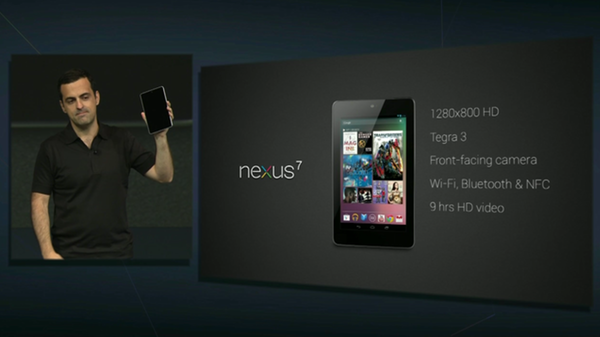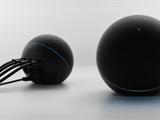Google's $199 tablet is here!
After Jobs passed away, the benchmark of the tech world that was renowned for its strict confidentiality seemed to have collapsed. There were no more secrets in the tech world. The news about Google's tablet was no exception. A day before the press conference, Gizmodo Australia leaked specific parameters, which were subsequently "confirmed" by serious media such as Bloomberg and Reuters. - Of course, Apple could not protect itself either. A week before WWDC, a high school student from 9to5mac almost "guessed" all the major news about WWDC 2012.
These are the specifications of Google's "officially inherited" Nexus tablet, which are almost the same as the information leaked by Gizmodo earlier:
• 1.3 GHz Tegra 3 quad-core processor (including 12-core GPU)
• 1 GB RAM
• 8 G/16 G storage
• Equipped with NFC, Android Beam
• 7-inch IPS screen, resolution 1280 x 800
• 1.2 million front camera (no rear camera)
• Battery life for 9 hours of video playback
Compared to previous rumors, there are only minor changes in price: $199, and if purchased on the Google Play store, you can get a $25 gift card. In addition, the tablet's battery life is described as "can last 9 hours playing 720P video", so normal web browsing or standby should be longer than this time.
Regarding the name of the tablet, it continues the Nexus brand in Google's smartphone field, and like the first generation Nexus phone, there is no information about the contract manufacturer in the name (ASUS Nexus 7).
Revolutionizing Kindle Fire
The price is the same as confirmed by various news agencies before the launch, at $199. This price easily reminds people of Amazon's Kindle Fire. Although Kindle Fire basically has no relation to Google, it is classified under the Android camp in statistics, and is interpreted by the media as "the popularity of Kindle Fire helps Android increase its share in the tablet market". Now, with the same price as Kindle Fire but completely different hardware configuration, when people talk about "Nexus competing with Apple", don't forget that the first one to be revolutionized is their own "pseudo-brother" Kindle Fire.
In addition to revolutionizing the first-generation Kindle Fire, the Nexus tablet also has a direct and simple violent impact on the second-generation Kindle Fire: upgrade the hardware configuration to match the Nexus tablet. If external factors are not considered, this effect is precisely the original motivation for Google to make its own tablet computer - this motivation is different from Microsoft Surface. John Gruber said Surface is a product of Microsoft pursuing high profit margins, and to achieve this goal, even at the cost of falling out with allies.
Benchmark for Android tablets
Undoubtedly, Nexus will become the benchmark for future Android tablets, just like the "first son" Nexus series smartphones. Previously, the scattered members of this camp were Galaxy Tab, HTC Flyer, Kindle Fire... As a benchmark product, the parameters of the Nexus tablet are instructive: 7-inch IPS screen, nVIDIA chip, running memory, storage space, battery life, etc. These will become the baseline for future products of various Android tablet manufacturers, at least the goal they strive to approach. However, there is no doubt that the price cannot be so low. After all, the Transformer Prime, which is also an ASUS tablet, is priced at $499.
Google tablets will also face pressure from market promotion. Should they continue the strategy of letting OEMs "you eat meat, I drink soup" used in the Nexus series smartphones, or take full responsibility themselves? This will be an important question for Google to consider. We know that when Google promoted the Nexus One, it intended to摆脱carrier restrictions and sell entirely through online channels, but this strategy obviously failed in the US market where carriers are strong. Times have changed, the promotional environment for tablets is not as passive as that for smartphones because tablets mainly use Wi-Fi data traffic and are less controlled by carriers. In fact, there are almost no people who buy iPads on contract from carriers; previously, US carriers had relatively weak control over Android tablets.
OEM or personally taking action?
So now the question is whether Google is ready to fight hard in the tablet computer market itself? The answer is basically yes. ASUS' OEM tablets may just be a transitional period. After testing the waters, Motorola will be the main force of Google's tablets.
Jobs invented the term "post-PC era", and in fact we have already entered this era; Microsoft, which never made hardware, began to make its own OEM, and now Google has also entered this field. Tablets are absolutely a strategic stronghold. Why should Google subject itself to more restrictions when it can do so (with Motorola)? However, maintaining the openness of the Android system will be Google's consistent tone. Other manufacturers are willing to make Android tablets, using the Android OS is not a problem - the problem comes from cost control.
From an external perspective, time is running out for Google. IDC data shows that in the first quarter of this year, iPad's share in the global tablet market reversed the decline and rose from 57% in the fourth quarter of last year to 68%, showing signs of fatigue among iPad competitors. Gartner's report shows that by 2016, iPad's market share will drop to 46%; Microsoft tablets restarted this year will increase from zero to 12% - this data was predicted before Microsoft announced Surface, if Surface tablets expected to be launched at the end of the year are included, Microsoft's share will further increase. Therefore, Google is actually facing pressure from both Apple and Microsoft. IDC predicts that tablet shipments will reach 106.1 million units this year and grow to 198.2 million units by 2016. If Google does not personally take action, the situation is not optimistic.
Of course, interestingly, the area Google focuses on - 7-inch tablets - is a missing area for iPad and Microsoft (Surface is 10.6 inches). If Google operates this area well, it will also form its own threshold (brand, price, user experience, etc.). I just hope that the inexpensive Nexus tablet doesn't have as bad an experience as Kindle Fire.




